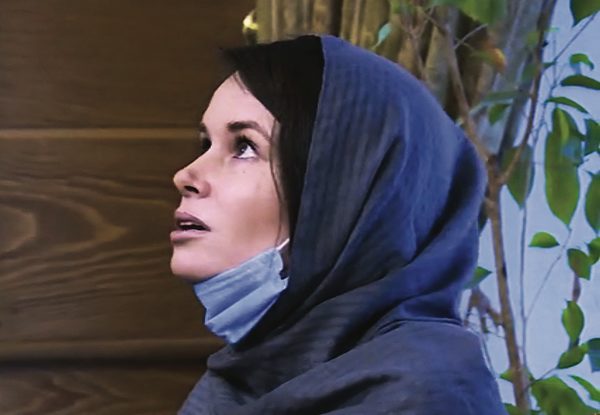Kylie Moore-Gilbert says the nightmarish 804 days she spent wrongfully incarcerated in an Iranian prison drew her closer to her adopted religion of Judaism.
Then a lecturer in Middle Eastern studies at Melbourne University, Moore-Gilbert was arrested at Tehran airport in September 2018 after attending an academic conference, just as she was about to board her flight home to Australia.
Iran’s Islamic Revolutionary Guard Corps (IRGC) had discovered her then husband Ruslan Hodorov was a dual Russian-Israeli citizen, which contributed to Moore-Gilbert’s arrest on the trumped-up charge of espionage. Among the various accusations thrown at her was that she was a spy for Israel, a spy for Australia and that Hodorov was a Mossad agent.
She survived months of solitary confinement and relentless interrogation in Tehran’s notorious Evin prison, before she was handed the maximum sentence of 10 years during a farcical trial that presented zero evidence against her.
“Without any hope whatsoever you just spiral very quickly into a really dark place”
“Because there was no spotlight and there was no attempt by anybody to verify what was going on in the court or report on the legal proceedings, they got away with the most ridiculous sham trial you can imagine,” Moore-Gilbert told The AJN this week, ahead of her appearance at a WIZO morning tea in Sydney next Tuesday.
She had already spent 12 months in prison before reports of her arrest emerged and now, two years after her release, Moore-Gilbert has revealed the horrific details of her ordeal in her memoir, The Uncaged Sky.
“It was cathartic for me to tell my story in my own words, but at the same time I feel a duty to tell my story for the other prisoners left behind,” she said.
“Some of them told me, Kylie, please use your voice, speak out, tell the world what’s happening because we can’t.”
Moore-Gilbert has dedicated her book to two of her cellmates, Niloufar Bayani and Sepideh Kashani, environmental activists who remain in jail. Their friendship and support, from covert communication to hunger strikes in solidarity, was crucial to her survival, she said.
“We created a little bubble, a little community of our own in the prison,” she said.
“We were able to learn together and enjoy each other’s company and distract each other from the harsh reality of what we were all facing.”
But there were moments when she lost all hope, particularly when she went months without any information about what was being done to try to free her.
“Without any hope whatsoever you just spiral very quickly into a really dark place,” she said.
“Some of them told me, Kylie, please use your voice, speak out, tell the world what’s happening because we can’t”
“There were a few points when I had that feeling, but I managed to drag myself out of it and I didn’t inhabit that despair for long, which I’d seen others do.”
As ‘punishment’ for one of her outbursts Moore-Gilbert had no contact with her family for over six months, but that turned out to be something of a blessing.
“Not speaking to the outside world was a relief because it stopped me psychologically from drawing myself back there and reflecting on what I was missing out on,” she said.
“It would be really painful for me to hear about people’s lives back home. Just being disconnected was a relief in a way because I could just focus on the here and now in the prison and try and block out any thoughts of home.”
Moore-Gilbert’s interrogators knew she had converted to Judaism and they taunted her for it, but rather than waver from her beliefs, she said prison actually strengthened them.
“You’re forced to confront all of these existential questions, so I think I felt closer to religion,” she said. “It’s comforting in a way. It definitely drew me closer rather than pushed me away.
“The Revolutionary Guards are very antisemitic.
“They were always denying the Holocaust and saying horrible things, but they were also interested in Judaism and I had a lot of conversations with them about Judaism and Israel. Some of them were more open minded than you’d expect.”
A high-stakes prisoner swap ultimately led to Moore-Gilbert’s release in November 2020, but she returned home to discover her husband had started an affair with her university colleague while she was incarcerated.
“Having my life turned upside down is hard,” she said.
“You think in your head, I’m going to go home and it’s going to be like it was before, but of course it never is and having to grapple with some of those changes has been tough. It’s a process, but I think I’m in a positive place.”
That’s not to say she doesn’t hold any anger towards the IRGC for the two years and three months taken from her life.
Moore-Gilbert is using her voice to draw attention to what is still happening in Iran and she implores Australia to do more.
“There’s no proper coordinated attempt by Western countries to band together and do more to penalise Iran and disincentivise what it’s doing by taking hostages,” she said.
“I hope my story will create greater awareness about that. I call on the Australian government to do more in finding mechanisms to address it.”
For readers in Sydney, call the WIZO office and Sponsor a Child to be invited to the event: (02) 9387 3666


comments